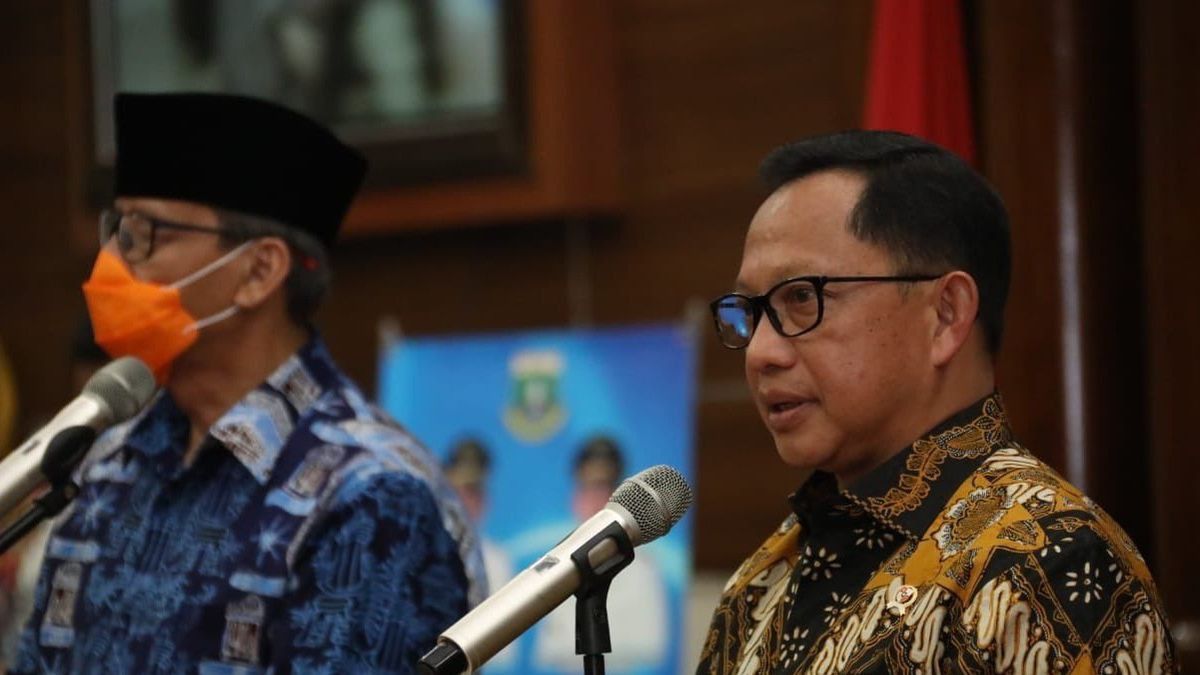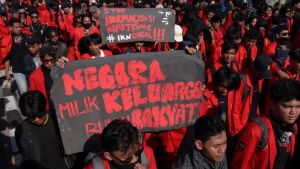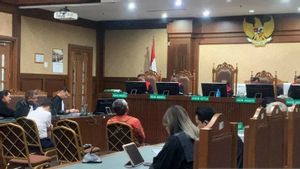JAKARTA - Home Affairs Minister Tito Karnavian plans to hold a competition to curb the COVID-19 transmission curve for local governments.
Previously, the Ministry of Home Affairs held a video competition for the simulation of the new normal order protocol during the COVID-19 pandemic entitled 'Regional Innovations in a New Normal Order' which spent IDR 168 billion as a prize for the winner.
Some have questioned the plan for a race about curving the COVID-19 transmission curve. This is because the competition is considered to cause new problems and is vulnerable to being politicized by regional heads.
FKM UI Epidemiologist Tri Yunus Miko Wahyono questioned the assessment process for the competition. This is because each province, district and city has a different number of cases and it is difficult to compare them with one another.
He gave an example, the transmission of COVID-19 in each province was different. For example, Jakarta is compared to East Java, West Java, and other cities. According to Miko, the province has different numbers of cases and handling efforts.
"In Jakarta, it is almost the same as in East Java, 9,000 cases. Even now in Jakarta there are 10,000 cases in East Java. So there are very different cases that cannot be compared. Not even districts. So what you want to assess, while the capacity of the Task Force has the capacity that is different. different, "said Miko when contacted by VOI, Monday, June 22.
"We have 514 districts, 34 provinces, each of which has a different task force for each province and has a different number of cases," he added.
This kind of competition, he said, also very likely cheating, such as data manipulation. The trick is to include new cases with minimal symptoms in the list of people without symptoms (OTG).
"OTG is a person without symptoms, then people can enter a minimal symptom case. If you just cough, just put it in the OTG. Who knows, in the village or district there is something like that. Little cases, lots of OTG. So how do you do it, OTG can be a lot," he said.
Instead of holding a competition, Miko assessed, the government through the Ministry of Home Affairs (Kemendagri) should make a new, more standard, normal phase standard. In addition, the government must increase the capacity of the Task Force for the Acceleration of Handling COVID-19 at the city / district level.
Meanwhile, Epidemiologist from the University of Indonesia Pandu Riono assessed that this competition could actually be counterproductive to fighting the COVID-19 pandemic in Indonesia. He even considered that manipulation could be quite dangerous if done.
"If there is a competition, it can be counterproductive if you are not careful. Like there is no need to test, it will slope," said Pandu, adding that the government should focus on increasing sample testing.
He said, PCR-based sample testing, conducting massive contact tracing in the community, and isolation were more important than holding a race to plague the COVID-19 curve.
Can be politicized ahead of the 2020 PilkadaA public policy observer from Trisakti University, Trubus Rahardiansyah, assessed that the race to hit the COVID-19 curve was made because the central government saw the local government as sluggish in solving this pandemic problem. It's just that, he considered, this competition has no urgency.
Moreover, according to him, this competition can become a political stage for regional heads who will advance in the 2020 Pilkada which will be held on 9 December.
"There is a concern (this competition) becomes a political stage. So, yes, there could be data manipulation by not reporting the real incident, reluctance to carry out the test," said Trubus.
In addition, in its implementation, Trubus assessed that there were several problems in it. Moreover, COVID-19 is arguably one of the steps for the incumbent regional head to gain votes during the Pilkada.
"Is the regional head in its implementation transparent, including the allocation of the budget as well. Then does the regional head who is injury time (will advance as incumbent) have good public accountability? I don't think so, it's hard. Even if he does, it is usually hampered by political interests. conflicts of interest, "he stressed.
"The intention is good to encourage regional heads to break the chain of the spread of COVID. But implementation is difficult," he added.
Previously, Minister of Home Affairs Tito planned to carry out a competition to mark the COVID-19 curve with local governments as participants. This competition, he said, had already been discussed with the Head of the Task Force for the Acceleration of Handling COVID-19 and other ministries.
"We discussed earlier with the Head of the Task Force, the Minister of Health, and the Ministry of Finance. We might create another competition, namely a competition for local governments to make the curve possible. This means reducing the spread of COVID-19," said Tito in Jakarta, Monday, June 22. .
Through this competition, the central government will measure which areas can quickly lower the COVID-19 curve over the past month or two. In its implementation, local governments can involve health experts.
So hopefully, areas that are in the red zone of COVID-19 can enter the yellow zone. Likewise, areas that were in the yellow zone can enter the next, safer zone.
"There will be several criteria being assessed. We are first formulating with the Task Force, Ministry of Health, Ministry of Finance for regional incentive funds," said Tito.
With this competition, it is hoped that Tito will be able to foster a competitive climate between regions to prepare for the order of life in a new normal, productive and safe phase of COVID-19.
"There is a competitive climate between regions to compete with each other, to compete to reduce the spread. Make the color green without manipulating the data," he said.
Prior to this competition, the Ministry of Home Affairs held a competition entitled 'Regional Innovation in a New Normal Order'. The government disbursed a budget of Rp. 168 billion as a prize for the winner of the race. The contestants are required to make a simulation video of the new normal order protocol in the midst of the COVID-19 pandemic.
The prizes are in the form of regional incentive funds (DID) to 84 winning regional governments. The first winner gets IDR 3 billion, the second winner IDR 2 billion, and the third winner IDR 1 billion.
This competition, he said, was made as a campaign step for the new normal phase. According to the former National Police Chief, before the winners were selected, 2,517 simulation videos were received by the committee from various local governments. Each video is two minutes long.
The winners for 'Regional Innovation in a New Normal Order' are as follows:
A. Provincial Cluster Public Transportation Sector:1. East Java 2. Bali3. Central Kalimantan
City Cluster1. Bengkulu2. Banda Aceh 3. Semarang
Regency Cluster1. Sintang2. Tegal3. North Tapanuli
Disadvantaged District Cluster1. Jayawijaya 2. West Seram3. Sula Islands
B. Provincial Cluster Tourist Sites Sector1. Central Java 2. East Java 3. South Sulawesi
City Cluster1. Semarang 2. Bogor3. Pare-pare
Regency Cluster1. Sintang2. Gunung Kidul 3. Trenggalek
Disadvantaged District Cluster1. Sigi2. Rote Ndao3. West Scary
C. One Stop Provincial Cluster Service Sector1. Central Sulawesi2. North Kalimantan 3. Central Java
City Cluster1. Bekasi2. Bandung3. Surabaya
Regency Cluster1. Trenggalek2. Sinjai3. Situbondo
Disadvantaged District Cluster1. Nias 2. West Seram3. West Sumba
D. Provincial Cluster Hotel Sector1. Jambi 2. North Kalimantan 3. South Sulawesi
City Cluster1. Pekanbaru 2. Surabaya3. Semarang
Regency Cluster1. Trenggalek2. Kebumen3. Sintang
Disadvantaged District Cluster1. Southwest Sumba 2. West Seram3. Tojo Una-una
E. Provincial Cluster Restaurant Sector1. Lampung 2. DI Yogyakarta 3. Jambi
City Cluster1. Bogor 2. Tangerang3. Jambi
Regency Cluster1. Trenggalek2. Tabalong3. Lumajang
Disadvantaged District Cluster1. Southwest Sumba 2. West Sumba 3. West Scary
F. Provincial Cluster Modern Market Sector1. East Java 2. Lampung3. In Yogyakarta
City Cluster1. Bogor 2. Sukabumi3. Semarang
Regency Cluster1. Aceh Tamiang 2. Kebumen3. Tulungagung
Disadvantaged District Cluster1. West Seram2. Belu3. Nias
G. Provincial Cluster Traditional Market Sector1. Bali 2. South Sulawesi 3. Lampung
City Cluster1. Bogor 2. Semarang3. Palembang
Regency Cluster1. Banyumas2. Lumajang3. Semarang
Disadvantaged District Cluster1. Limbata2. West Seram3. West Coast
The English, Chinese, Japanese, Arabic, and French versions are automatically generated by the AI. So there may still be inaccuracies in translating, please always see Indonesian as our main language. (system supported by DigitalSiber.id)










